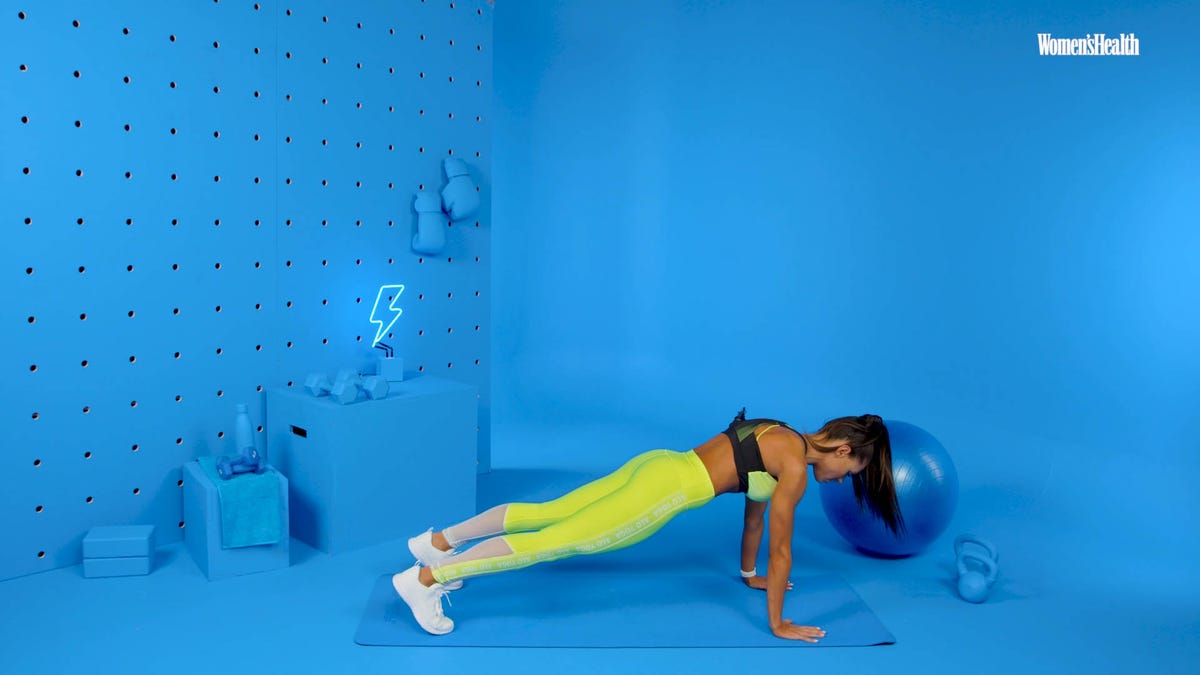Polycystic ovary syndrome (a.k.a. PCOS) is a condition that impacts one in 10 women of childbearing age. So the odds that you or someone you know has it are pretty high. Managing PCOS often involves a number of lifestyle factors—and exercise is an important one.
In case you’re not familiar with it, PCOS is a syndrome in which an imbalance of reproductive hormones contributes to issues such as irregular ovulation, irregular egg development, irregular or missed periods, infertility, excess hair on the face and chin, acne, weight gain, and thinning hair, according to the U.S. Office on Women’s Health (OWH). Though reproductive health is a primary concern for people with PCOS, the health condition can impact your life in a lot of different ways.
If you have PCOS, this probably isn’t news to you. What you may not know, though, is how much exercise can help with your symptoms. “Exercise is very important for women with PCOS,” says Tara Scott, MD, chief medical officer and founder of Revitalize Medical Group.
So, why does movement make such a difference for those with—and what types of workouts should you focus your efforts on? Here’s everything you need to know—plus expert-backed tips for making your movement routine as PCOS-friendly as possible.
Why Exercise Is So Important For People With PCOS
There are a few reasons why movement can be so helpful when it comes to PCOS symptom management. First, one of the hallmarks of PCOS is insulin resistance, a condition in which the cells in your muscles, fat, and liver don’t respond well to insulin and can’t easily take up glucose (sugar) from your blood, Dr. Scott says. Insulin resistance can lead to prediabetes and diabetes over time, according to the National Institute of Diabetes and Digestive and Kidney Diseases (NIDDK). Luckily, exercise is proven to help improve glucose metabolism—or the way your body processes the sugar in your blood, Dr. Scott says. So, there’s win number one.
Regulating your insulin levels can help lower testosterone levels, which are typically high in people with PCOS, Dr. Scott says. So, a regular exercise routine has the potential to help combat testosterone-related symptoms like acne, hair loss, and unusual hair growth on your face, she says.
Finally, many women with PCOS also struggle with their weight, which can increase risk of a slew of health conditions, including high cholesterol, high blood pressure, sleep apnea, stroke, and heart disease, Dr. Scott says. Exercise, though, can help lower your risk.
“Women with PCOS should consider exercise part of their ‘prescription’ from their doctor,” Dr. Scott concludes. Along with a nutritious diet, movement can be so helpful for PCOS symptoms that it may even eventually allow you to cut back on medication, or come off it completely, she says (at the guidance of your doctor, of course).
How To Approach Exercise If You Have PCOS
Not sure where to start in creating a workout routine that’s as PCOS-friendly as possible? Keep this advice in mind.
1. Consistency Is Key
Dr. Scott recommends making exercise a part of your normal routine. Strive to pencil in at least four workout sessions per week, with each lasting for at least 30 minutes.
2. Focus Your Resistance Training on Endurance
Higher volumes and intensities of strength training can temporarily raise testosterone levels, which people with PCOS may want to avoid, according to Dr. Scott.
That absolutely does not mean you should fear the weights, though. Just focus your resistance training sessions on endurance, which means lifting lighter weights (or using your body weight or resistance bands) for a higher number of reps, says trainer Sandy Sklar, CPT, co-owner of Prescriptive Fitness. She recommends performing anywhere between 10 and 20 reps of a given move per set.
3. HIIT Is Your Cardio BFF
Instead of sweating away on the treadmill or going for long runs on cardio days, opt for HIIT, suggest Dr. Scott and Sklar.
“Studies have shown high-intensity interval training (HIIT) is the best for women with PCOS,” Dr. Scott says. “Short bursts of cardio have the best effect on your metabolic balance.” Case in point: When two groups of women with PCOS did either HIIT or strength training three times a week, after 10 weeks, the women who did HIIT had experienced the most significant improvements in insulin resistance, one PLoS One study found.
To try HIIT on a cardio machine, alternate between 30 seconds of running (or jogging, depending on your fitness level) and 30 seconds of walking recovery for 10 to 20 rounds, says Sklar.
Or, if you’re at home, perform two or three rounds of the following exercises. Do each move for 30 seconds, then rest for 30 and continue onto the next, Sklar says. Once you’ve finished all exercises, start back up from the top.
Want someone to guide you through your entire sweat? Try this advanced HIIT sesh from Kelsey Wells:
4. Create A Balanced Routine
High levels of intense exercise have been linked with menstrual cycle irregularities, so if you’re already having cycle issues because of PCOS, Dr. Scott recommends a more moderate approach. Your best bet: Balance your sweat efforts and give yourself both lower-intensity and higher-intensity days.
If you work out five days a week, for example, focus on three days of cardiovascular exercise (like HIIT) and two days of resistance training, Sklar says.
5. Start Slow
If exercise hasn’t really been your thing in the past, don’t worry about doing everything suggested here from the get-go. “If you are a beginner or lack the motivation to exercise, just try to find an activity you enjoy,” says Sklar. “Walking, swimming, or participating in a recreational sport is a great place to start. Any physical activity or movement is better than none.”
Ultimately, the more you like the movement you do, the more consistently you’ll stick with it and the greater health rewards you’ll reap.
The bottom line: Exercise is a game changer for people with PCOS. Experts recommend a balance of endurance-focused resistance training and HIIT, but if you have questions about your routine and health, check in with your doctor.
Korin Miller is a freelance writer specializing in general wellness, sexual health and relationships, and lifestyle trends, with work appearing in Men’s Health, Women’s Health, Self, Glamour, and more. She has a master’s degree from American University, lives by the beach, and hopes to own a teacup pig and taco truck one day.





